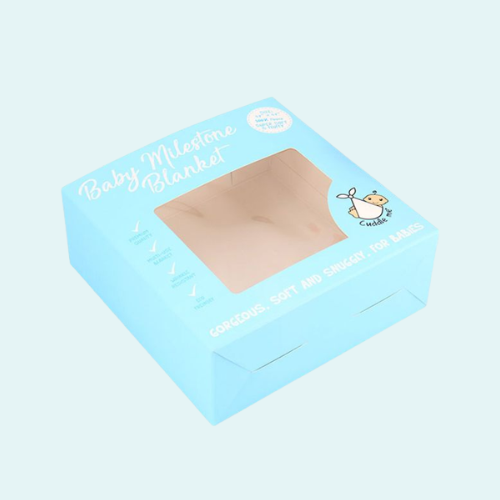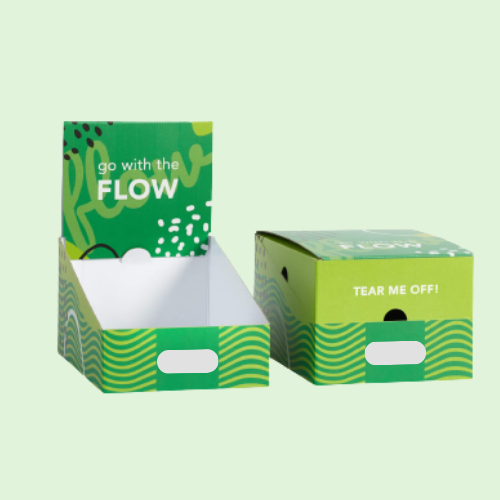In current food industry, where consumer preferences are shifting towards eco-friendly practices, Kraft paper is emerging as a revolutionary force. Not only is it kind to the environment, but it also offers numerous benefits that enhance both your product and brand. In food packaging industry, environment friendly packaging is crucial. Learn how crownpackages’ Kraft paper boxes not only maintain food freshness but also cater to eco-conscious consumers.
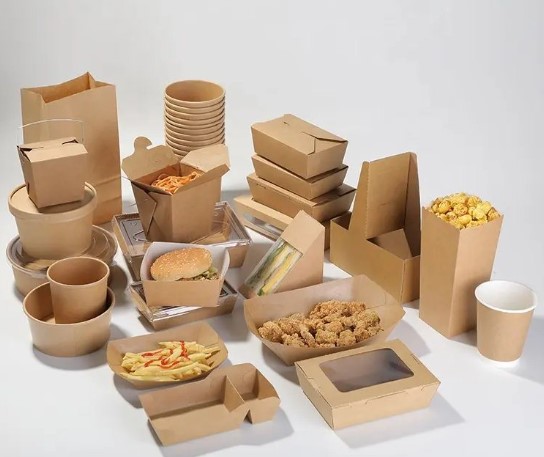
At CrownPackages, we understand the importance of sustainable packaging solutions. We offer a wide variety of high-quality Kraft paper box that are perfect for any food business.
Strength and Durability for Keeping Your Food Safe
Kraft paper is renowned for its inherent strength. This can be further enhanced with a polyethylene (PE) coating, creating a barrier against moisture, bacteria, and minor impacts. This ensures your food arrives fresh and intact, even during long-distance shipping. Lightweight yet robust, these boxes withstand transportation hazards, ensuring products reach customers unharmed.
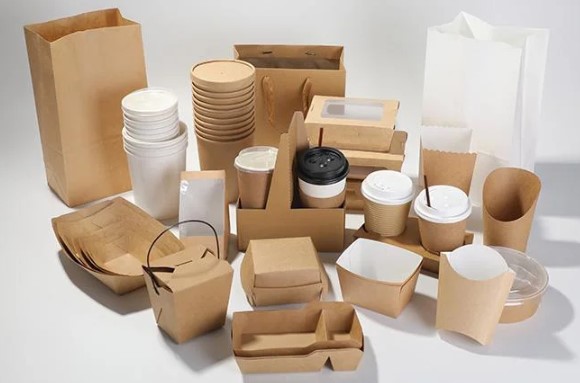
Exceptional Performance
Kraft paper excels in various aspects crucial for food packaging. It offers:
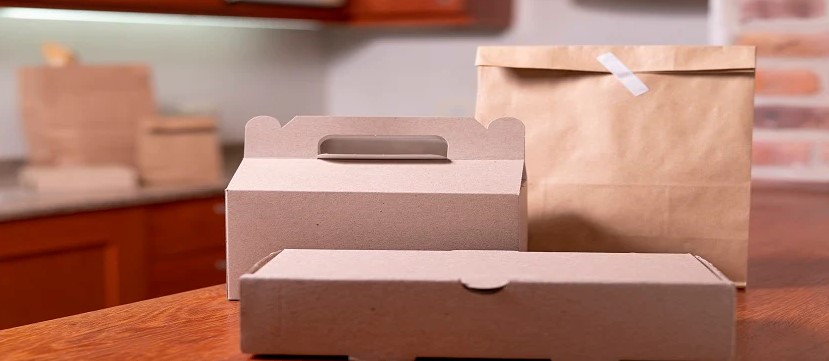
- Moisture Resistance: Protects food from moisture-related spoilage.
- Waterproofing: Provides a reliable barrier against water damage.
- Oil Immersion: Ideal for packaging greasy or oily food items.
- Low-Temperature Freezing: Maintains food quality during frozen storage and transportation.
- Extended Shelf Life: Contributes to longer product freshness.
These qualities ensure your food reaches customers in its best possible state.
Rustic Charm of Kraft Paper Boxes
With their natural brown hue, Kraft paper box elevates food presentation, enhancing product appeal. Customizable with PVC windows, they provide a glimpse of the contents, enticing informed purchasing decisions. This earthy look complements a variety of food products, especially those with vibrant colors. This visual contrast creates a mouthwatering presentation that entices customers.
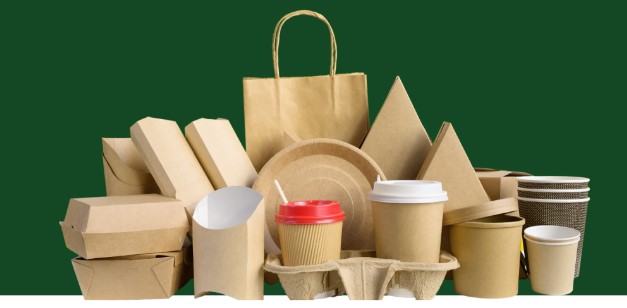
Safest Option for Food Packaging
FDA-approved and food-grade, Kraft paper is a secure choice, eliminating contamination risks. Its chemical-free production process maintains food integrity, making it ideal for various food types.
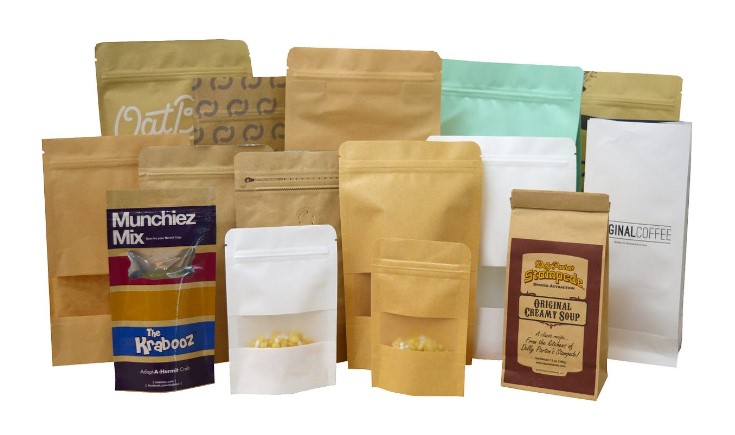
FDA-Approved Assurance
The Food and Drug Administration’s stamp of approval on Kraft paper underscores its credibility as a safe packaging option for food items. Rigorous testing and adherence to stringent regulations ensure that Kraft paper meets the highest safety standards, providing consumers with peace of mind regarding the products they consume.
Chemical-Free Production
Unlike conventional packaging materials that may contain harmful chemicals, Kraft paper boasts a production process that is entirely chemical-free. From sourcing raw materials to the final packaging stage, Kraft paper undergoes minimal processing, preserving the purity and freshness of the enclosed food products.
Maintaining Food Integrity
The inherent properties of Kraft paper make it an ideal choice for maintaining food integrity. Its natural composition creates a breathable barrier that regulates moisture levels, preventing food spoilage and preserving freshness over extended periods. Whether it’s bakery delights, confectionery treats, or gourmet delicacies, Kraft paper ensures that every bite is as delicious and wholesome as intended.
Versatility Across Food Types
From dry goods like cereals and snacks to perishable items like dairy and meat products, Kraft paper caters to a diverse range of food packaging needs. Its versatility extends to various packaging formats, including pouches, boxes, and wraps, accommodating different product sizes and shapes with ease.
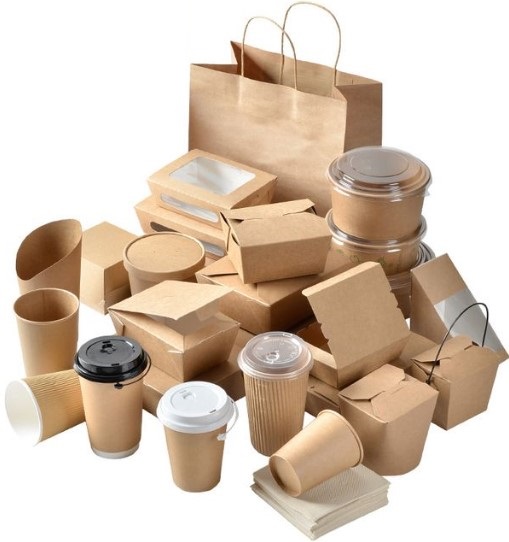
Environmentally Conscious Choice
Beyond its safety credentials, Kraft paper aligns with environmentally conscious consumer preferences. As a renewable and biodegradable material, it minimizes environmental impact throughout its lifecycle, from production to disposal. Choosing Kraft paper for food packaging not only ensures food safety but also contributes to a healthier planet for future generations.
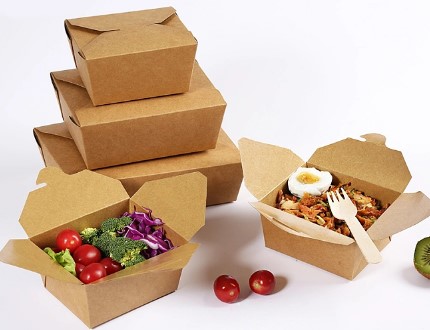
Informative Packaging for Customer Attention
Kraft paper box allows you to include essential information like product details, usage instructions, and even sustainability messages. This transparency builds trust with customers and allows them to make informed choices.
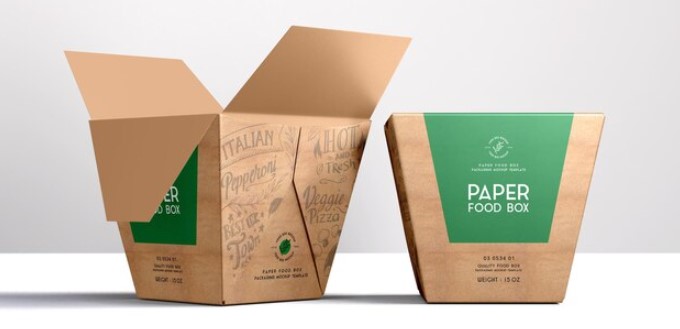
Consumers are increasingly drawn to brands that prioritize sustainability. By using Kraft paper, you demonstrate your commitment to the environment. This resonates with eco-conscious consumers and helps build brand loyalty.
Customization Options at CrownPackages
Seamlessly incorporate branding essentials like logos and artwork on Kraft paper boxes. With ample space for product information and sustainability messaging, these boxes serve as effective marketing tools. CrownPackages offers a wide range of customization options for your Kraft paper boxes. You can incorporate your logo, brand colors, and other branding elements. We also provide finishing techniques like embossing and debossing for a touch of elegance.
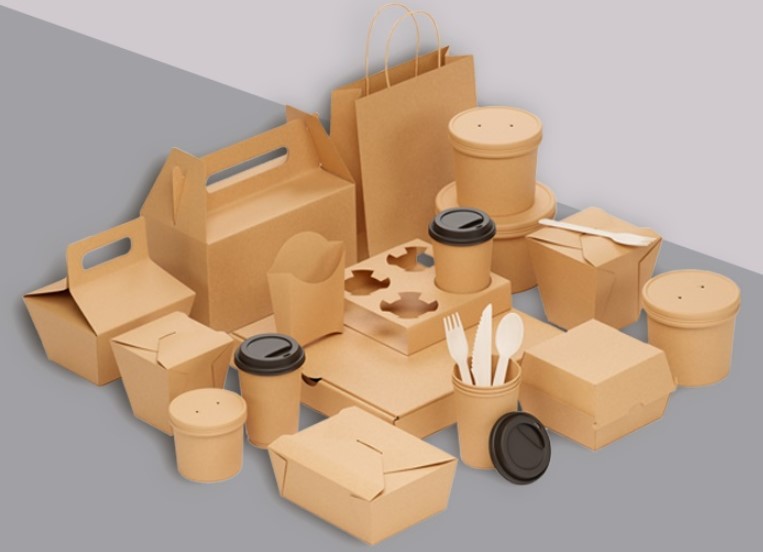
A Smart Investment You Should Go For
Compared to other packaging materials, Kraft paper is a cost-effective option. This affordability makes it ideal for businesses looking to optimize packaging costs without compromising quality. Affordable yet high-quality, Kraft paper boxes optimize packaging costs without compromising quality. Versatile and eco-friendly, they continue to revolutionize the food packaging industry.
Moreover, Kraft paper offers the ideal balance between environmental responsibility and customer satisfaction. It keeps your food fresh, showcases your brand effectively, and caters to the growing demand for sustainable solutions.
Conclusion
Crownpackages’ Kraft paper boxes offer an eco-friendly, versatile, and effective packaging solution for the food sector. Invest in Kraft paper boxes to reduce your carbon footprint while keeping your food items fresh and appealing! At CrownPackages, we are passionate about helping food businesses thrive with sustainable packaging solutions. Contact us today to discuss your Kraft paper box needs and discover how we can elevate your brand while protecting the planet.
Frequently Asked Questions
What are the 4 types of food packaging?
Polyethylene, Plastic Bottles, Glass Containers, and Boxes/cartons are the four main types of food packaging.
What is food packaging?
Food packaging involves enclosing food to protect it from environmental factors that could cause contamination, damage, or decay during transport, storage, or sale.
What are the 5 methods of food packaging?
Traditional food packaging materials include glass, metals, paper and paperboards, and plastics, both rigid and flexible. Each material offers unique properties suitable for different types of food products and packaging requirements.
What packaging materials are used for food?
Plastic is a widely used food packaging material due to its versatility, affordability, and ability to provide a barrier against moisture and other contaminants. Common types of plastic used in food packaging include Polyethylene, Polyvinyl Chloride, and Shrink Film. Additionally, glass containers offer excellent preservation properties and are often used for packaging sauces, preserves, and beverages. Metal packaging, such as aluminum cans, provides durability and protection against light, moisture, and air, making it suitable for canned foods and beverages. Paper and paperboard materials are also extensively used in food packaging due to their versatility, recyclability, and ability to be formed into various shapes and sizes, including cartons and boxes.
What is the difference between food packaging and food packing?
Packing involves enclosing products in containers or boxes for transportation, while packaging serves a broader purpose of protecting products, identifying brands, and providing information about the company and the product. While both packing and packaging are essential for ensuring the safe transportation and presentation of food products, packaging plays a more significant role in marketing and branding by communicating product information and brand identity to consumers.
What is the main role of food packaging?
The primary role of food packaging is to protect food products from external influences, damage, and contamination during transportation, storage, and sale. Additionally, food packaging helps to contain the product, provide consumers with information about the product, including ingredients, nutritional content, and usage instructions, and serves as a marketing tool to promote brand identity and attract consumers.
What are the characteristics of food packaging?
Food packaging should possess several key characteristics to effectively protect and promote food products. These characteristics include the ability to contain the product securely, protect it from external factors such as moisture, light, and air, communicate essential product information to consumers, and enhance the presentation and marketability of the product. Additionally, food packaging should be convenient to handle and use, ensuring a positive experience for consumers.
Is kraft paper food packaging safe for direct contact with food?
Yes, kraft paper food packaging is specifically designed and approved for direct contact with food. Kraft paper is made from natural, unbleached fibers and does not contain any harmful chemicals, making it safe for use with food products.
Can kraft paper food packaging be recycled?
Yes, kraft paper is inherently recyclable and biodegradable, making it an environmentally friendly choice for food packaging. After use, kraft paper food packaging can be recycled through standard paper recycling processes, reducing waste and environmental impact.
How does kraft paper compare to plastic packaging in terms of environmental impact?
Kraft paper is considered more environmentally friendly than plastic packaging due to its biodegradable nature and lower environmental footprint. Unlike plastic, which can take hundreds of years to decompose and often contributes to pollution and environmental degradation, kraft paper decomposes naturally over time, returning to the environment without causing harm. Additionally, kraft paper production requires less energy and resources compared to plastic production, further reducing its environmental impact.
Can kraft paper food packaging withstand moisture and grease?
Yes, kraft paper food packaging is resilient against moisture and grease, making it suitable for packaging a wide range of food products, including oily and moist items. Kraft paper is treated during manufacturing to enhance its resistance to moisture and grease, ensuring the integrity of the packaged food and maintaining its freshness and quality.
Is customization possible with kraft paper food packaging?
Yes, kraft paper food packaging offers ample opportunities for customization, allowing businesses to incorporate branding elements, logos, product information, and designs onto the packaging. Customization options include printing, embossing, debossing, and adding special finishes such as foil stamping or UV coating. By customizing kraft paper food packaging, businesses can create unique and eye-catching packaging solutions that effectively promote their brand and products to consumers.
